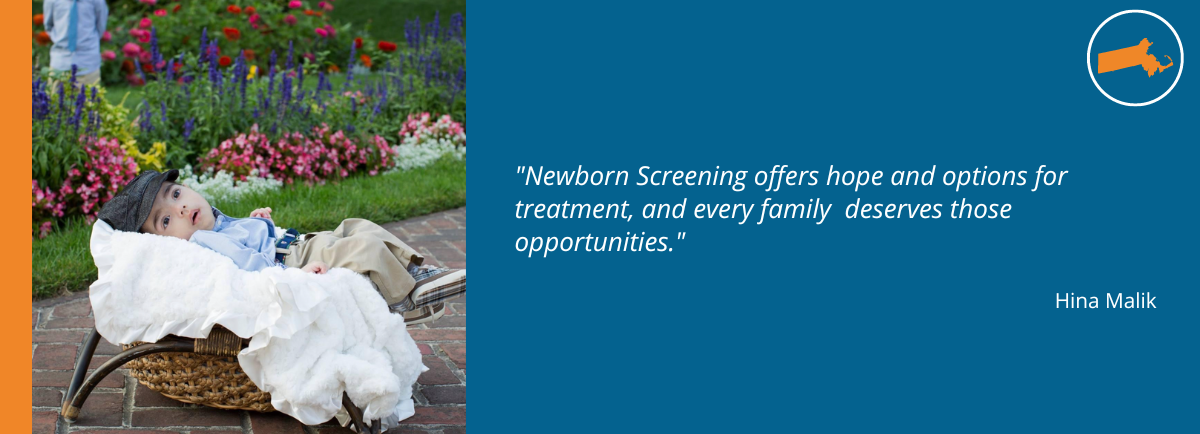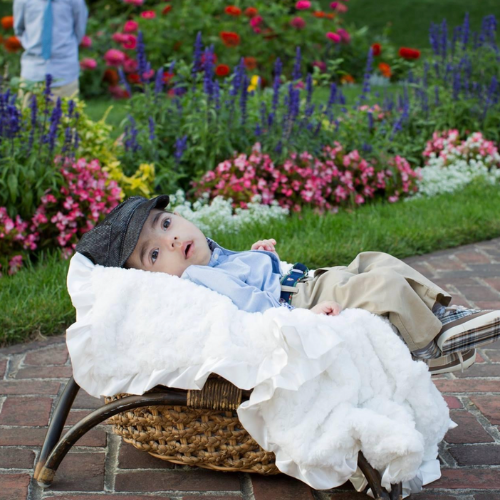DOWNLOAD STATE FACT SHEET AS PDF

In 2020, there were 66,428 live births in Massachusetts2 There are 66 conditions on the Massachusetts Newborn Screening Panel3
All babies in the United States are screened for several conditions shortly after birth. Approximately 24-48 hours after a baby is born in the United States, the heel is pricked by a nurse to collect a small blood sample. Afterward, the nurse puts a series of blood drops onto a filter paper to create several “dried blood spots.” Next, the newborn screening card is sent to the state laboratory for analysis. Massachusetts is not screening for Krabbe Disease.
What is Krabbe Disease?
Krabbe disease (pronounced krab A), is a rare genetic disorder, also known as globoid cell leukodystrophy. In the United States, Krabbe disease has been reported to affect approximately 1 in 100,000 individuals. Infantile Krabbe disease is the most common and severe form causing infants to lose the ability to eat, extreme irritability, inability to sit up, grasp objects, blindness, and seizures. Sadly, infants die within the first 2-3 years of life in states that do not test for Krabbe disease. We invite you to learn more about Understanding Krabbe Disease.
Why Screen for Krabbe Disease?
Krabbe disease is a severe neurodegenerative and rapidly progressing condition requiring immediate treatment for the most severe forms. The medical issues and symptoms of Krabbe disease are very significant and life-impacting. A delayed diagnosis, especially in the most severe forms, equates to palliative and supportive care as the only means of treatment until premature death.
Krabbe Disease Hero: Hasan Jawaid

See all our Krabbe Disease Heroes.
Hasan was a beautiful, happy baby who was always smiling and would giggle at the drop of a hat. He loved watching his older brother do silly things around him and seemed to be perfectly healthy. Around four months of age, his mother, Hina, began to notice a few changes: Hasan stopped meeting his developmental milestones and his smiles were replaced with relentless cries. He wanted to be held and rocked constantly. At his six-month well visit, they were urgently referred to a neurologist at Boston Children’s Hospital because of his alarming regression. This was the beginning of a month of doctor visits, bloodwork, and an MRI, and led to a devastating diagnosis when Hasan was seven months old: Krabbe Disease. Hina was at work and received a phone call from the neurologist, telling her the unbelievable news. Their world collapsed before their very own eyes and Hina felt like the ground was being pulled out from under her. It was one of the worst days of their lives. The neurologist said that Hasan’s life expectancy was less than two years and that he was not eligible for treatment because his symptoms were advanced.
Krabbe Disease robbed Hasan of his ability to see, speak, move, eat, and, most importantly, smile. His short life of only two years was filled with medical problems that many don’t encounter in their lifetime. He needed around-the-clock care for everything including feeding, meds, bathing, turning, and repositioning. Hassan loved bath time, music therapy, and being around his older brother. Sadly, Hasan lost his battle with Krabbe in November 2014.
Hasan’s family looks forward to the day when each state is screening for Krabbe Disease so that every affected child is given a fair chance at life, something that Hasan didn’t receive. Newborn Screening offers hope and options for treatment, and every family deserves those opportunities.
Resources
- The Leukodystrophy Newborn Screening Action Network is dedicated to advancing newborn screening for leukodystrophies and lysosomal storage disorders, supporting newly-diagnosed families, and ensuring collaboration between all stakeholders. Learn more at https://ldnbs.org/.
- CDC offers funding and assistance through the Newborn Screening Quality Assurance Program (NSQAP). More information can be found at https://www.cdc.gov/labstandards/nsqap.html.
- Baby’s First Test provides funding opportunities through grants. Learn more at https://www.babysfirsttest.org/newborn-screening/funding-opportunities.
- American Public Health Laboratories NewSTEPS program provides data, technical assistance, and training. Details at https://www.newsteps.org/.
- KrabbeConnect offers patient support services to help families navigate the burden of Krabbe disease. Learn more at https://krabbeconnect.org/.
- Hunter’s Hope Foundation is a non-profit organization committed to giving hope through education, awareness, research, and family care for all leukodystrophies. Learn more at https://www.huntershope.org/.
Citations
- Wenger DA. Krabbe Disease. 2000 Jun 19 [Updated 2011 Mar 31]. In: Pagon RA, Adam MP, Ardinger HH, et al., editors. GeneReviews® [Internet]. Seattle (WA): University of Washington, Seattle; 1993-2017.
- “Fertility Rate: Massachusetts, 2010-2020.” March of Dimes | PeriStats, https://www.marchofdimes.org/peristats/data?reg=99&top=2&stop=1&lev=1&slev=4&obj=1&sreg=34. Accessed 13 August 2023.
- “Massachusetts| Baby’s First Test | Newborn Screening | Baby Health.” Babysfirsttest.org, 2015, https://www.babysfirsttest.org/newborn-screening/states/massachusetts. Accessed 13 August 2023.
All information in this fact sheet is based on data available before August 13, 2023.


